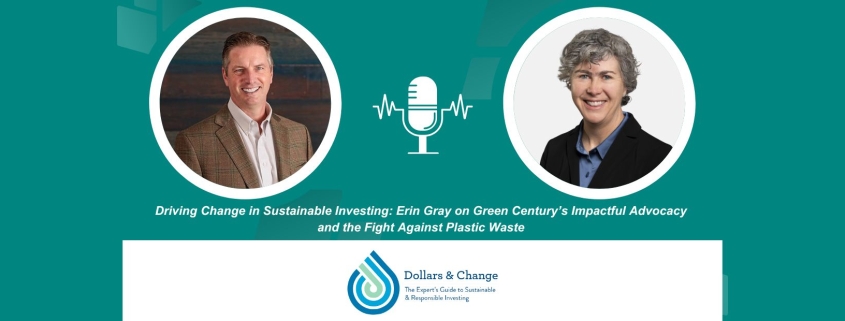Driving Change in Sustainable Investing: Erin Gray on Green Century’s Impactful Advocacy and the Fight Against Plastic Waste
In this recent episode of Dollars & Change: The Expert’s Guide to Sustainable & Responsible Investing, host Peter Krull had the privilege of sitting down with Erin Gray , the Vice President of Business Development at Green Century Funds. Green Century, a pioneer in sustainable investing, is known in the industry for its mission-driven ownership and dedication to environmental advocacy.
Erin opens the discussion by sharing her journey in sustainable finance, which began more than two decades ago. Combining her environmental and financial interests, Erin found a home at Green Century, helping it evolve alongside the broader industry. As she noted, the landscape of sustainable investing has shifted dramatically over the years, moving from a niche focus on socially responsible investing (SRI) to a more robust, data-driven approach incorporating environmental, social, and governance (ESG) factors.
Green Century’s Unique Approach
Founded by the Public Interest Research Groups (PIRGs), Green Century is owned by environmental nonprofits, setting it apart from traditional fund families. This structure allows Green Century to channel its profits into advocacy and public health campaigns, creating a powerful alignment between financial returns and positive impact.
Erin explained how Green Century takes a unique stance on advocacy, working closely with companies to improve their environmental practices. From reducing plastic waste to addressing climate change, the firm aims to create incremental but meaningful progress across industries. For example, when Green Century worked with Whole Foods years ago, they successfully advocated for the elimination of bisphenol A (BPA) in children’s sippy cups sold in their stores. This initiative eventually expanded to eliminate BPA in all plastics entering Whole Foods’ supply chain, showcasing how focused efforts can lead to broader systemic change.
Shareholder advocacy is an important part of how Green Century drives positive change. Erin highlighted several impactful campaigns, including efforts to reduce single-use plastics in hotel chains like Marriott and Hilton, as well as their work with Coca Cola to reduce plastic waste.
Fighting Plastic Waste
One of the most significant campaigns that Green Century has led involved Coca-Cola and its excessive use of plastic. Erin shared how Green Century filed a shareholder resolution, a formal request for the company to address this issue. As a result, Coca-Cola committed to reducing its use of new plastic by 3 million metric tons by 2025—a commitment equating to the reduction of 200,000 bottles per minute. While this was a solid first step, the engagement didn’t end there. Green Century pressed further, pushing Coca-Cola to explore refillable and reusable bottles as part of its strategy to reduce plastic waste.
Erin highlighted the importance of reintroducing infrastructure for refillable bottles, which was common in the past but has diminished with the rise of plastic. She shared that around 11% to 16% of Coca-Cola’s global beverage distribution currently uses refillable bottles, especially in regions like Latin America and Africa. The company committed to increasing this number to 25% by 2030—a bold and significant step in the right direction.
One of the more challenging aspects of the advocacy landscape today is the issue of “greenwashing,” where companies claim to be doing more for the environment than they actually are. But, Erin mentioned, a new phenomenon is emerging: “green hushing.” This is when companies make genuine, positive environmental changes but choose not to highlight them publicly due to fear of backlash or political issues. Erin and Peter both agreed that it’s frustrating when good work goes unrecognized but acknowledged that companies may feel they need to stay low-key to avoid being scrutinized or attacked. Erin’s reflections underscore the delicate balance companies must strike between pushing forward meaningful change and managing the political climate that can sometimes undermine their efforts.
For the complete episode, follow the link here or find Dollars & Change: The Expert’s Guide to Sustainable and Responsible Investing on your favorite podcast platform.
Check out some of our recent episodes:
- Melissa Booth, a climate scientist, discusses resilience in an era of unpredictable climate events, particularly in light of Hurricane Helene.
- Debbie Carlson, a seasoned freelance reporter, shares the evolving challenges of greenwashing and the importance of maintaining a sustainable investment focus amid climate risks and industry resistance.
- Kevin Baum, Chief Investment Officer at USCF Investments, spoke about the role of batteries, minerals, and sustainability in the energy transition.
We’d love to hear your thoughts on this topic. Share your feedback or suggest future topics by contacting us at info@earthequityadvisors.com.
Be good. Invest better.
The Earth Equity Team



